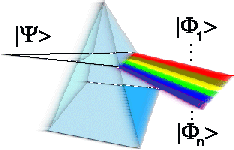Iwo Bialynicki-Birula and Zofia Bialynicka-Birula
The notion of the rotational frequency shift, an analog of the Doppler shift, is introduced. This new frequency shift occurs for atomic systems that lack rotational invariance, but have stationary states in a rotating frame. The rotational frequency shift is given by the scalar product of the angular velocity and the angular momentum of the emitted photon in full analogy with the standard Doppler shift which is given by the scalar product of the linear velocity of the source and the linear momentum of the photon. The rotational frequency shift can be observed only in a Mössbauer-like regime when the angular recoil is negligible.
Phys. Rev. Lett. 78, 2539 (1997)
Nov 5, 1996
May 30, 1996
Numerical studies of the dynamics of multiphoton processes with arbitrary field polarization: Methodological considerations
Etienne Huens, Bernard Piraux, Alejandro Bugacov, Mariusz Gajda
We describe an approach of spectral type for numerically integrating the time-dependent Schrödinger equation associated to the interaction of a one active electron atom with an electromagnetic pulsed field whose polarization may be arbitrary. The wave function is represented on a Coulomb-Sturmian basis. The time propagation method is based on a parallel-iterated Runge-Kutta method of predictor-corrector type. This method is in fact fully implicit and of very high order, ensuring a high stability of the time propagation. Moreover, it has the following advantages: it provides a scheme for an adaptive time step and it is particularly well suited to parallel computing. We discuss the performance of the present approach and compare it to already existing ones. In the case of linearly polarized fields, most of our results are in good agreement with those obtained with other approaches. In the case of circularly polarized fields, we compare our results with those obtained by, so far, the only existing method which is based on the single state Floquet approximation. Finally, and for the sake of illustration, we treat the case of the interaction of atomic hydrogen with a strong pulsed electromagnetic field whose polarization depends on time.
Phys. Rev. A 55, 2132 (1997)
We describe an approach of spectral type for numerically integrating the time-dependent Schrödinger equation associated to the interaction of a one active electron atom with an electromagnetic pulsed field whose polarization may be arbitrary. The wave function is represented on a Coulomb-Sturmian basis. The time propagation method is based on a parallel-iterated Runge-Kutta method of predictor-corrector type. This method is in fact fully implicit and of very high order, ensuring a high stability of the time propagation. Moreover, it has the following advantages: it provides a scheme for an adaptive time step and it is particularly well suited to parallel computing. We discuss the performance of the present approach and compare it to already existing ones. In the case of linearly polarized fields, most of our results are in good agreement with those obtained with other approaches. In the case of circularly polarized fields, we compare our results with those obtained by, so far, the only existing method which is based on the single state Floquet approximation. Finally, and for the sake of illustration, we treat the case of the interaction of atomic hydrogen with a strong pulsed electromagnetic field whose polarization depends on time.
Phys. Rev. A 55, 2132 (1997)
Jan 1, 1996
Photon generation by time-dependent dielectric: A soluble model
Markus Cirone, Kazimierz Rzążewski and Jan Mostowski
A soluble model of electromagnetic field interacting with time-dependent dielectric medium is given. The main assumption is that the dielectric constant is switched rapidly from the initial to the final value. Generation of electromagnetic field and photon statistics are found.
Phys. Rev. A 55, 62 (1997)
A soluble model of electromagnetic field interacting with time-dependent dielectric medium is given. The main assumption is that the dielectric constant is switched rapidly from the initial to the final value. Generation of electromagnetic field and photon statistics are found.
Phys. Rev. A 55, 62 (1997)
Subscribe to:
Comments (Atom)
